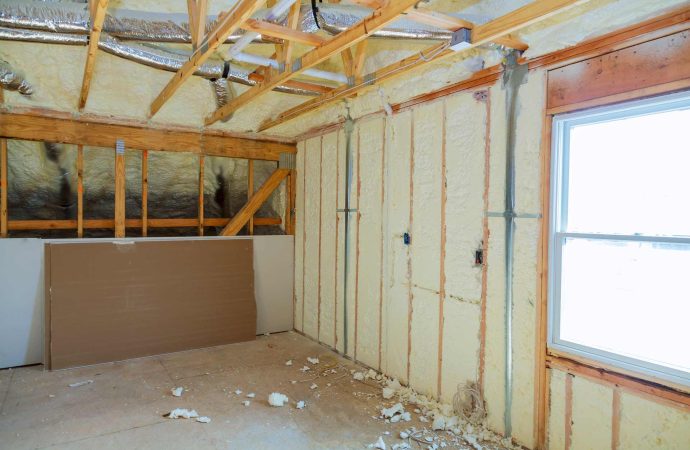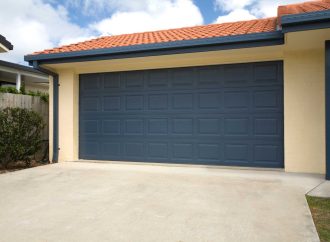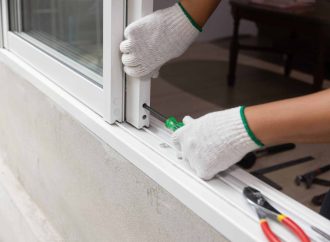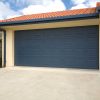Insulation maintains our home at your preferred temperature all year, protecting against extreme cold in the winter and excessive heat in the summer. It is also an effective approach to reduce noise pollution. A well insulated house is very energy efficient and requires very little additional heating. To reach this point there are certain areas
Insulation maintains our home at your preferred temperature all year, protecting against extreme cold in the winter and excessive heat in the summer. It is also an effective approach to reduce noise pollution. A well insulated house is very energy efficient and requires very little additional heating. To reach this point there are certain areas of your home that are vital in maintaining its efficiency such as the attic, basement, and walls to name a few. Insulation services can mean the difference between a cozy or uncomfortable living space.
Assist your roof with attic insulation
Attic insulation is great for improving heating within your home. However, in addition, proper attic insulation can also keep your roof in better condition by helping prevent ice dams and condensation. Here is a deeper look at how attic insulation can benefit you and your home.
Prevent Ice Dams:
Hypothetically, if you do not have insulation, heat from your home escapes through your ceiling into your attic. As a result, your shingles are at a greater temperature throughout the winter. Warmer shingles may melt the snow that has accumulated on top of them. As temperatures decrease, or melting ice makes its way to the cooler eaves, it refreezes as ice. This is known as an ice dam. Ice dams can have a significant influence on the performance and durability of your roof’s shingles. They increase the likelihood of leaks and may cause harm to your gutters if they spread into them. The easiest method to avoid ice dam damage is to use proper insulation in your attic. You should ensure that your attic is adequately ventilated and that an ice and water protection is installed.
Easier to heat and cool your home:
When your attic is properly insulated, more heat stays in your home during the winter and less heat radiates down from your attic during the summer. This heat resistance makes it less expensive to heat or cool your home to your preferred temperature making the interior of your home much more comfortable.
Consistent temperatures throughout your home:
Attic insulation keeps conditioned air in the home rather than allowing it to escape through the ceilings, which may result in a more fixed temperature from ceiling to floor. This may make your house more comfortable, especially if you have cathedral ceilings.
Ceiling insulation for all-year comfort
Warm air rises to the ceiling, while cooler air falls. When you put on the heat in the winter, the hot air rises and settles towards the ceiling. Following that, it will either heat up the room or migrate to the roof area and outside your home. Heat loss generates a vacuum that allows cold air to drop into the living area, forcing your heating system to work overtime to warm up the room. The added benefit of ceiling insulation is reduced heating and cooling costs.
Additional benefits of ceiling insulation are:
Increase home comfort:
Insulation reduces heat transmission, allowing your rooms to stay warm in the winter and cool in the summer. After you insulate the ceiling, you may notice the largest difference in your home’s comfort throughout the summer. During the summer, the ceiling may get quite hot, giving the impression that you are standing in direct sunlight. Insulation decreases the stress on your air conditioner by slowing the heat pouring in. In the winter, you can notice a change in the form of fewer drafts between rooms. Insulation in your ceiling and throughout your home minimizes the number of cycles your furnace goes through to keep your home pleasant and extends its life by 10 to 20 years.
Better indoor air quality:
Proper ceiling insulation can prevent external contaminants from entering your home and causing poor indoor air quality. External contaminants can enter through air leaks caused by inadequate home insulation. Ceiling insulation can help to battle this by preventing the entry of external contaminants that cause indoor mold and mildew. Indoor mold is not only unappealing, but it may also cause illness in you and your family. Another advantage of ceiling insulation is that it eliminates pollutants from your insulation system, giving your home fresh air.
Floor insulation
Most home improvement contractors prioritize exterior walls and attics when it comes to insulating a living area. However, they can frequently overlook flooring, which is a vital part of insulation projects. An insulated surface complements other features used to heat up areas, such as central heating and quick-seal windows. The combination of dead air and an insulating surface, such as rubber flooring, acts as a poor conductor of heat, reflecting warmth back into your space. As a result, it is beneficial to invest in a surface that keeps the living area warm while lowering heating expenditures, which is why insulating your flooring is another important area to consider when installing insulation. Some added benefits of floor insulation are:
Creates a vapor barrier and keeps moisture at bay:
Most flooring, including hardwood, wall-to-wall carpeting, and cork, are susceptible to moisture damage. This can lead to bigger problems like mold or mildew. Rubber, on the other hand, is insulated, moisture-resistant, and antimicrobial, and it helps to build a vapor barrier, keeping moisture from entering the home.
Keeps pipes from freezing:
Pipes are prone to splitting or bursting in severe winters and icy zones because the water they transport frequently freezes. If your property contains pipes beneath the flooring, you would not see or assess the damage caused by such cold temperatures. Choosing an insulated or freeze-thaw surface adds a layer of insulation between the pipes and the outside elements, providing additional protection.
Added benefits in the summer months:
Insulated surfaces, in addition to being useful in the winter, aid in controlling the interior temperature in the summer. The same heat principle applies, as a n insulating surface, such as a cold rubber surface, will prevent conditioned air from escaping, keeping the space cooler than the exteriors. This eliminates the need for regular air cooling.
Wall insulation for comfort in every room
One of the most common areas in a home where insulation is found is inside the walls. It acts as a secondary barrier to the outdoor climate along with the exterior materials like brick or siding. However, if walls are lacking insulation this can be a troublesome issue because it can create an uncomfortable indoor environment while also causing your HVAC system to work harder to cool or heat your home. Hence, why the walls of your home should be equipped with appropriate insulation, for that added comfort and reduced cooling and heating costs. There are additional benefits to insulating your walls that can include:
Sound dampening:
Insulating walls can lessen unpleasant sounds from outside and sound transmission from one room to another. By insulating your walls, you can reduce sound transmission and make the most of every area in your home. With insulated inner walls, you may not have to worry about the TV being overly loud since sound will not travel as far as it would without insulation.
Thermal boundary:
Wall insulation is beneficial for a variety of reasons, but it also works by increasing the density of your walls. Wall insulation fills up the area between your walls, making more material for heat to go through and transmit around the house. By ensuring that your house has adequate wall insulation, you can keep your home air at a consistent temperature by preventing heat from escaping through the crevices between the walls.
Fight low underground temperatures with basement insulation
It is common for basements in a home to be transformed from a storage space to an extended living area. If you use your basement for either function it can be vital to either protect what you have stored or have a comfortable area to live in. Seasonal comfort and reduced heating and cooling expenses from your basement requires proper insulation.
Basements tend to be cold and damp no matter what time of the year because the exterior walls absorb underground temperatures on all sides of the home. Furthermore, where there is no physical barrier between the interior and exterior of your basement walls, coldness and dampness will seep inside causing an unpleasant living environment. An efficiently insulated basement can mitigate this issue and help with annual savings on winter heating and summer cooling. In addition, a well insulated basement that is dry and comfortable provides a livable living space and adds additional value to your home.
As mentioned above there are vital areas you may need to consider when adding insulation to your home. Each has their own benefits but to further reap the rewards of proper insulation, having a combination of these areas properly insulated can ensure your entire home is covered and kept at a comfortable temperature. There are also a number of factors that go into the installation process and if you have any questions, speak with a professional that provides insulation services.

















